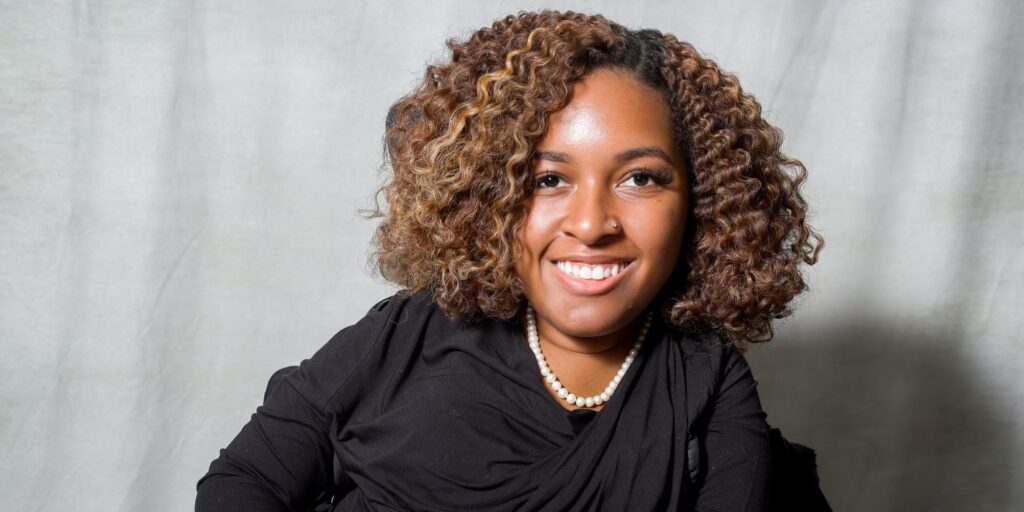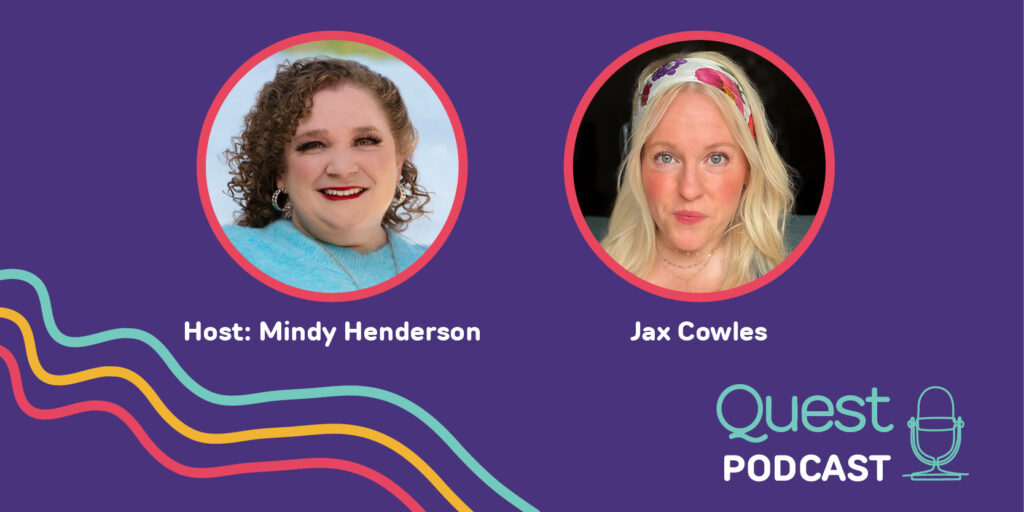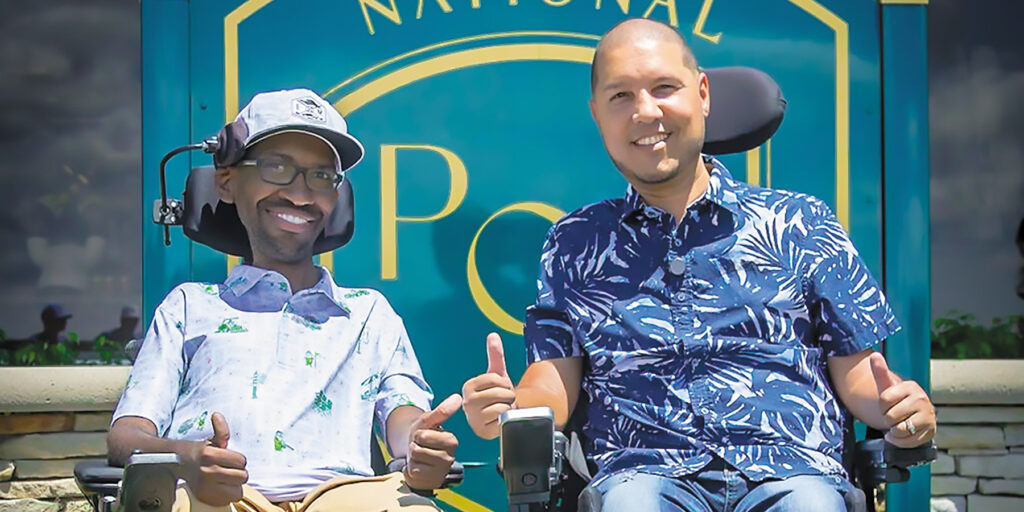
A Deep Dive Into MDA’s Ambassador Program
By Megan Kramer-Salvitti | Tuesday, August 13, 2024
Since the program’s inception, 48 National Ambassadors and countless General Ambassadors have shared their stories and authentic perspectives.
The MDA Ambassador Program is a foundational program at MDA, beginning with its first National Ambassador, Michael Danna, in 1952. Since the program’s inception, 48 National Ambassadors and countless General Ambassadors have shared their stories and authentic perspectives to raise awareness and advance the MDA mission. Here, Quest Media speaks with Scott Wiebe, MDA’s Director of Community Programs, and Laura McClellan, MDA’s Manager of Community Programs, about how the Ambassador Program has evolved and how the community can get involved.
What is the Ambassador Program, and how has it changed?
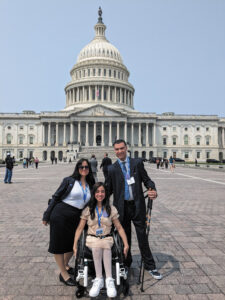
MDA National Ambassador Leah Zelaya (center) with her mother Bevi (left) and father Jaime (right), also an MDA Ambassador
Scott: The MDA Ambassador Program allows individuals living with neuromuscular disease to share their stories, help raise awareness, and connect with the MDA community. Ambassadors are crucial to advancing MDA’s mission to empower those living with neuromuscular diseases, and we have deep appreciation for their engagement and support.
Formerly, the program included local, state, and national Ambassadors. Today, it consists of National Ambassadors — the most publicly visible representatives of the neuromuscular community — and General Ambassadors. This shift supports the reality that Ambassadors are no longer only local; rather, they have an opportunity to share their stories and make an impact on a larger scale while still being able to connect locally with MDA supporters and events.
The MDA National Ambassador program has evolved, too. Historically, the National Ambassador was always a child. Now, MDA has two National Ambassadors — one adult and one child — to better represent the breadth of the community.
Over the years, MDA’s Ambassador Program has had different names and has evolved considerably. However, the core intent of the program remains the same: Engaging individuals and families living with neuromuscular diseases to raise awareness about the lived experience of the MDA community through their own authentic viewpoints.
What do MDA Ambassadors do?
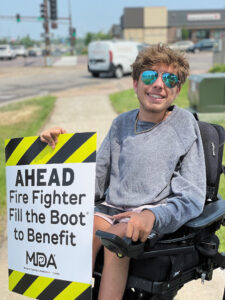
MDA Ambassador Luke
Laura: There are many ways to be involved, and each individual’s engagement is tailored to their strengths and interests. Some Ambassadors are fantastic public speakers, while others write impactful thank-you notes, sharing why research investment or programs like Summer Camp are important to them. Some love spending time with our fire fighter partners during Fill the Boot drives, while others share their insights on educational panels or write guest blogs for Quest.
Scott: Ambassadors’ support of MDA’s fundraising efforts is incredible. Sharing personal stories and experiences connects donors and partners to MDA’s mission, which strengthens our fundraising initiatives, and that in turn allows MDA’s mission to thrive, funding groundbreaking research, advancing MDA’s advocacy initiatives, and much more.
Why is the Ambassador Program important?
Scott: The Ambassador program is central to our mission to empower the people we serve.
Everyone processes living with a neuromuscular disease differently and has a unique journey. Many Ambassadors have said that engaging with this program and sharing their story is empowering. By helping others better understand what living with a neuromuscular disease is like, allowing others who have neuromuscular diseases to feel more supported, and giving back to the community, being an Ambassador is a meaningful experience for many people. Ambassadors are also beacons for others within the community to look to; seeing stories like their own lessens the likelihood in the future that someone feels alone and misunderstood.
What is the application process?
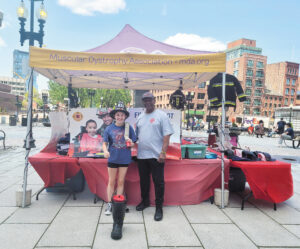
MDA Ambassador Breylyn
Laura: All members of the neuromuscular community are invited to apply to represent MDA as General Ambassadors. The application is for a year-long, renewable term.
A member of MDA’s team meets virtually with each applicant to learn more about their unique journey and discuss how they’d like to engage with the program. Ambassadors can be any age and live with any neuromuscular diagnosis and are selected based on their passion for raising awareness and their commitment to MDA’s mission. The process for National Ambassadors differs in that they are selected by MDA from the group of General Ambassadors.
We are fortunate to have an incredibly talented, diverse, and committed group of Ambassadors. I am consistently amazed by their accomplishments, authenticity, and the impact they have on the community.
Megan Kramer-Salvitti is an editor and writer for Quest Media.
What MDA Ambassadors Have to Say
MDA Ambassadors love to share their stories to raise awareness and help others with neuromuscular diseases navigate everyday life. Here, some MDA Ambassadors explain why they participate in the program.
“I believe it is so important to raise your voice for things you are passionate about. This creates awareness and stimulates others to get involved. It creates community. … If we all just put in a little, we will make the world a better place.” — Leah Zelaya, National Ambassador
“It’s my hope that through positive and consistent public appearances, I encourage those early in their neuromuscular journey and clearly illustrate that being an adult with a neuromuscular condition can truly be a life of meaningful significance, happiness, and love.” — Ira Walker, National Ambassador
“The message I hope to spread is that we aren’t ‘inspiring,’ tokenized individuals — we’re people. The stories we have are broad, diverse, and powerful. We are dancers, teachers, singers, and doctors. We’re someone’s kid, someone’s parent. Spreading awareness — once a scary phrase for me — is, I believe, my main purpose on this earth.” — Jess Westman, General Ambassador
Next Steps and Useful Resources
- If you are interested in making an impact as an MDA Ambassador, learn more about the Ambassador role and apply.
- Stay up-to-date on Quest content! Subscribe to Quest Magazine and Newsletter.
Disclaimer: No content on this site should ever be used as a substitute for direct medical advice from your doctor or other qualified clinician.


